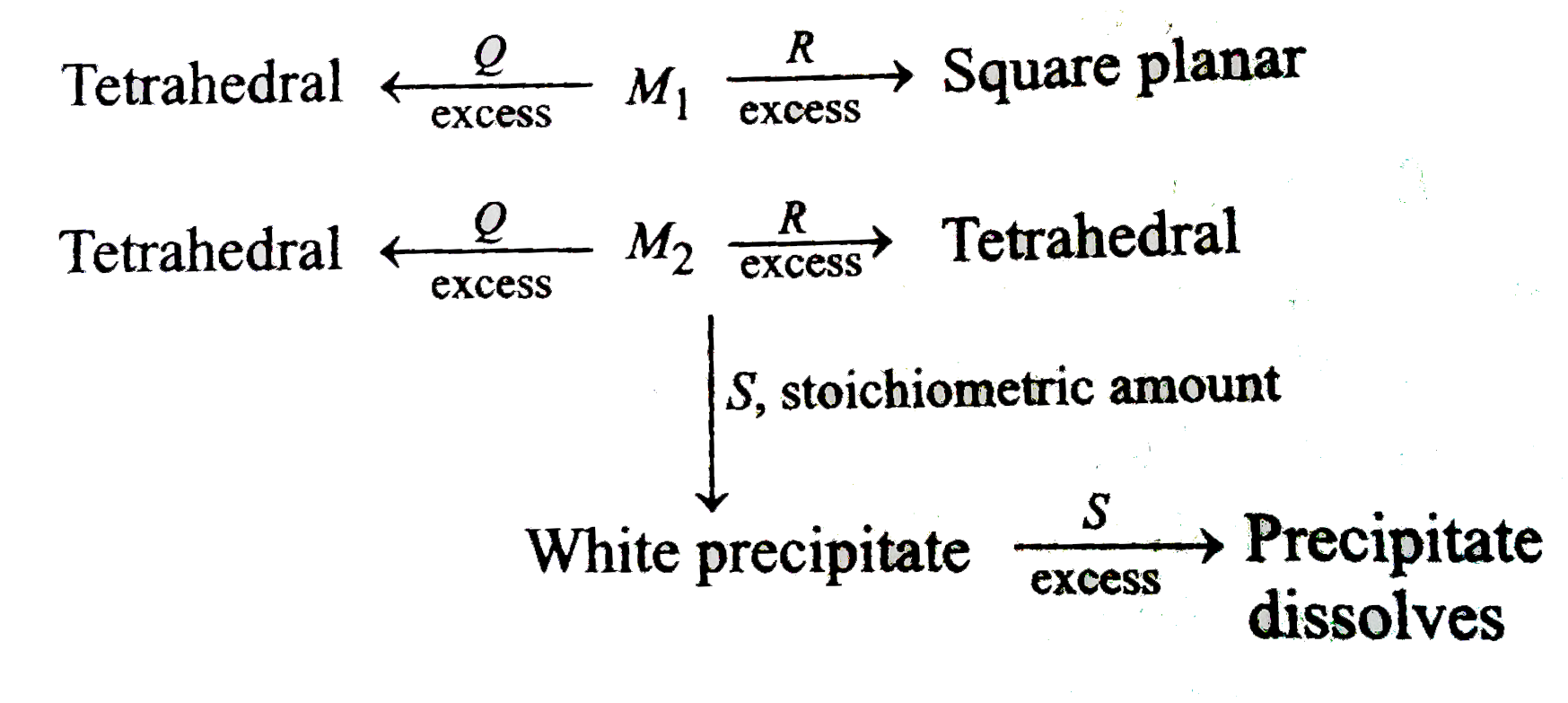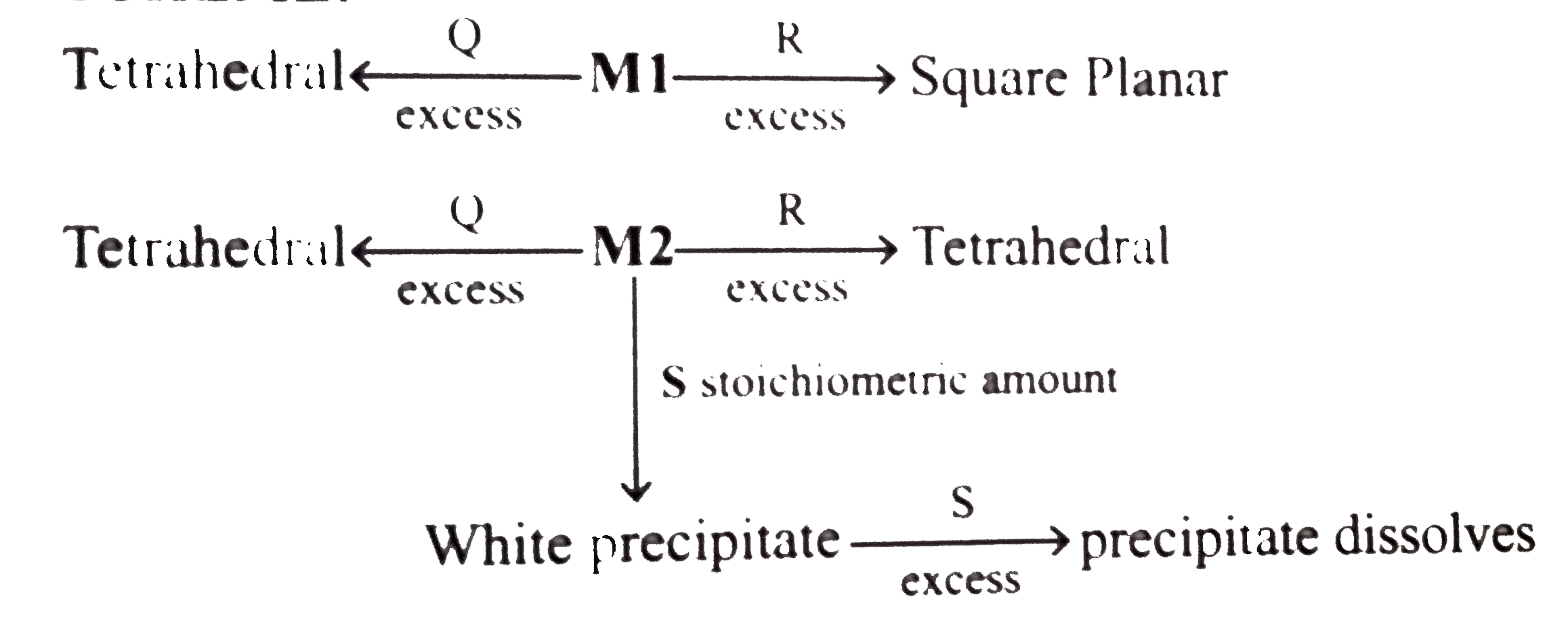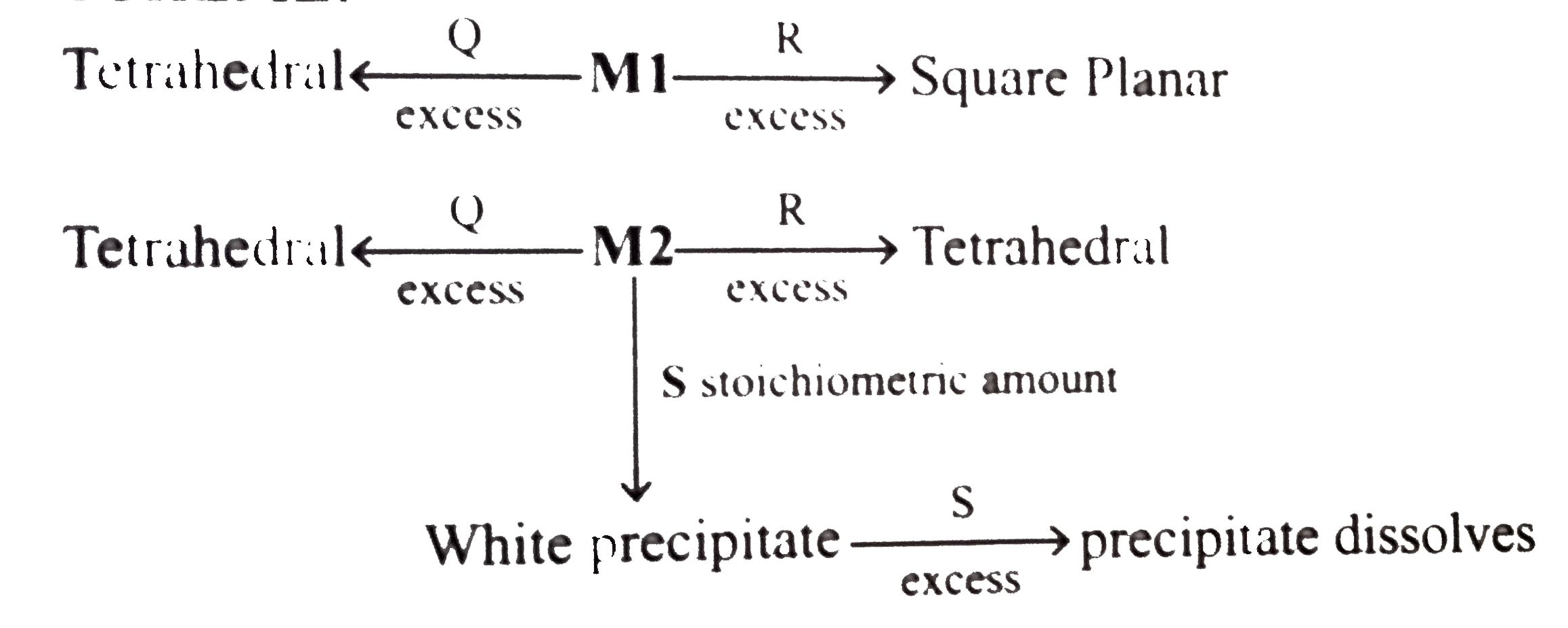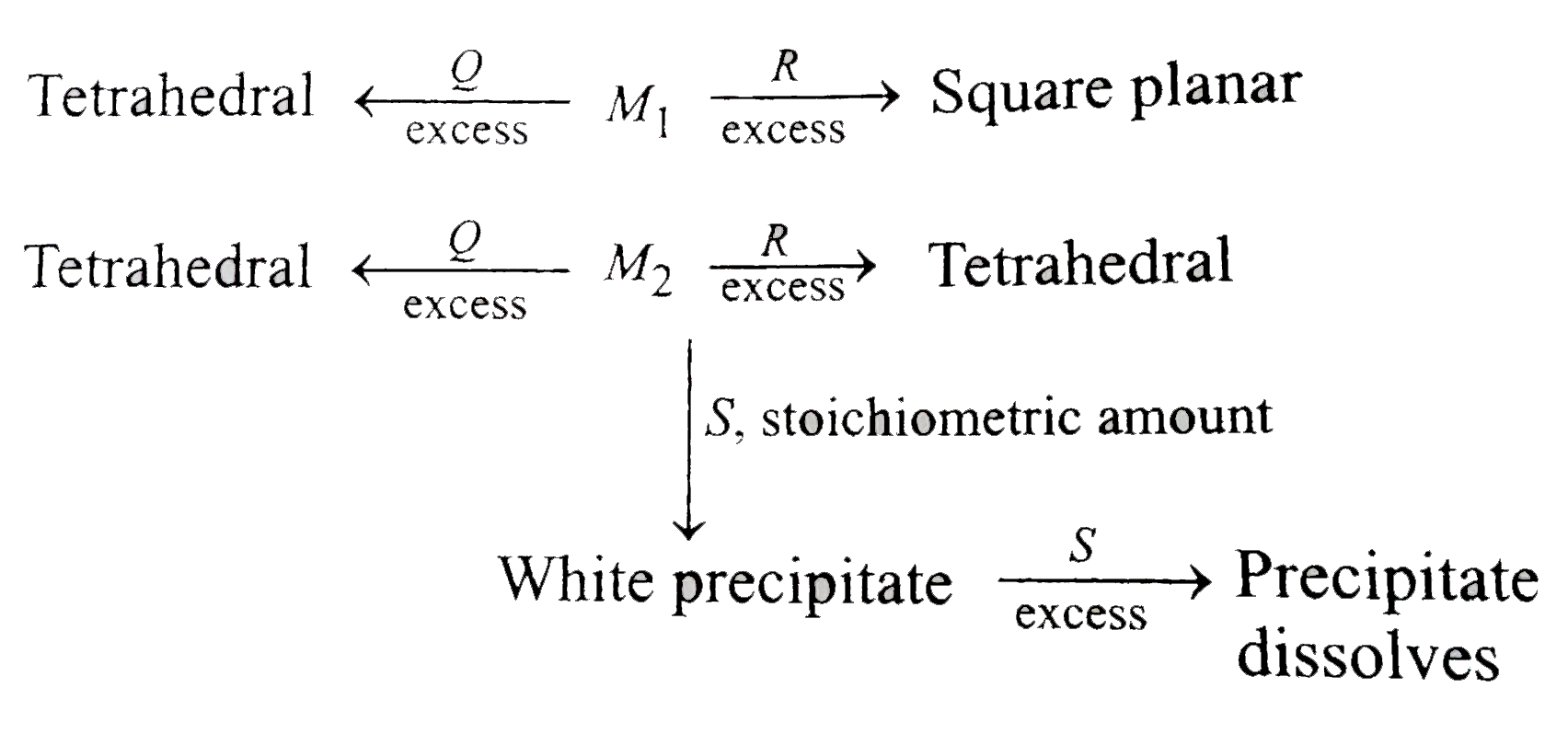An aqueous solution of metal ion M1 reacts separately with reagents Q and R in excess to gie tetrahedral and sqaure planar complexes, respectively. An aqueous solution of another metal ion M2 always forms tetrahedral complexes with these reagents. Aqueous solution of M2 on reaction with reagent S gives white precipitate which dissolves in excess of S. The reaction are summarised in the scheme given below
Scheme

M1,Q and R, respectively are
Zn2+,KCN and HCl
Ni2+,HCl and KCN
Cd2+,KCN and HCl
Co2+,HCl and KCN
The correct Answer is:B
Topper's Solved these Questions
- BOOK - IIT-JEE PREVIOUS YEAR (CHEMISTRY)CHAPTER - QUALITATIVE ANALYSISEXERCISE - Fill in the blanks1videos
QUALITATIVE ANALYSIS
- BOOK - IIT-JEE PREVIOUS YEAR (CHEMISTRY)CHAPTER - QUALITATIVE ANALYSISEXERCISE - True/False1videos
QUALITATIVE ANALYSIS
- BOOK - IIT-JEE PREVIOUS YEAR (CHEMISTRY)CHAPTER - QUALITATIVE ANALYSISEXERCISE - Objective Question I3videos
QUALITATIVE ANALYSIS
- BOOK - IIT-JEE PREVIOUS YEAR (CHEMISTRY)CHAPTER - PERIODIC CLASSIFICATION AND PERIODIC PROPERTIESEXERCISE - COMPREHENSION_TYPE3videos
PERIODIC CLASSIFICATION AND PERIODIC PROPERTIES
- BOOK - IIT-JEE PREVIOUS YEAR (CHEMISTRY)CHAPTER - S BLOCK ELEMENTSEXERCISE - True/False1videos
S BLOCK ELEMENTS
Similar Questions
An aqueous solution of metal ion MI reacts separately with reagents Q and R in excess to give tetrahedral and square planar complexes, respectively An aqueous solution of another metal ion M2 always forms tetrahedral complexs with theses reagents. Aqueous solution of M2 on reaction with reagent S gives white precipitate which dissolves in excess of S The reactions are summarised in the scheme given below: SCHEME :

What is M2View SolutionAn aqueous solution of metal ion MI reacts separately with reagents Q and R in excess to give tetrahedral and square planar complexes, respectively An aqueous solution of another metal ion M2 always forms tetrahedral complexs with theses reagents. Aqueous solution of M2 on reaction with reagent S gives white precipitate which dissolves in excess of S The reactions are summarised in the scheme given below: SCHEME :

What is S?View Solution
Knowledge Check
- Question 1 - Select One
An aqueous solution of metal ion M1 reacts separately with reagents Q and R in excess to gie tetrahedral and sqaure planar complexes, respectively. An aqueous solution of another metal ion M2 always forms tetrahedral complexes with these reagents. Aqueous solution of M2 on reaction with reagent S gives white precipitate which dissolves in excess of S. The reaction are summarised in the scheme given below
Scheme

Reagent S isAK4[Fe(CN)6]BNa2HPO4CK2CrO4DKOH - Question 2 - Select One
An aqueous solution of metal ion MI reacts separately with reagents Q and R in excess to give tetrahedral and square planar complexes, respectively An aqueous solution of another metal ion M2 always forms tetrahedral complexs with theses reagents. Aqueous solution of M2 on reaction with reagent S gives white precipitate which dissolves in excess of S The reactions are summarised in the scheme given below: SCHEME :
 AZn2+,KCN and HCI .BNi2+,HCI and KCN .CCd2+,KCN and HCIDCo2+,HCI and KCN
AZn2+,KCN and HCI .BNi2+,HCI and KCN .CCd2+,KCN and HCIDCo2+,HCI and KCN - Question 3 - Select One
An aqueous solution of metal ion MI reacts separately with reagents Q and R in excess to give tetrahedral and square planar complexes, respectively An aqueous solution of another metal ion M2 always forms tetrahedral complexs with theses reagents. Aqueous solution of M2 on reaction with reagent S gives white precipitate which dissolves in excess of S The reactions are summarised in the scheme given below: SCHEME :
 AK4[Fe(CN)6]BNa2HPO4CK2CrO4DKOH
AK4[Fe(CN)6]BNa2HPO4CK2CrO4DKOH
An aqueous solution containing S−2 ions will not give
View SolutionIn Aqueous solution, metal ion M1 reacts separately with reagents Q and R in excess to give tetrahedral and square planar complexes respectively. An aqueous solution of another metal ion M2 always froms tetrahedral complexes with these reagents. Aqueous solution of M2 on reaction with reagent S gives white precipitate which dissolves in excess of S. The reactions are summarized in the scheme given ahead

Reagent S isView SolutionIn Aqueous solution, metal ion M1 reacts separately with reagents Q and R in excess to give tetrahedral and square planar complexes respectively. An aqueous solution of another metal ion M2 always froms tetrahedral complexes with these reagents. Aqueous solution of M2 on reaction with reagent S gives white precipitate which dissolves in excess of S. The reactions are summarized in the scheme given ahead

M1, Q and R respectively areView SolutionAn aqueous solution of metal ion M1 reacts separately with reagents Q and R in excess to give tetrahedral and square planar complexes, respectively. An aqueous solution of anotherr metal ion M2 always forms tetrahedral complex with these reagents. Aqueous solution of M2 on reaction with reagent S gives white precipitate which dissolves in excess of S. The reactions are summarized in the scheme given ahead.
SCHEME:
Tetrahedral Q←−−excessM1R−−→excess Square planar
TetrahedralQ←−−excessM2R−−→excessTetrahedral ↓S.stoichiometric amount White pptS−−→excess.Precipitate dissolves
Reagent S is:View SolutionAn aqueous solution of metal ion M1 reacts separately with reagents Q and R in excess to give tetrahedral and square planar complexes, respectively. An aqueous solution of anotherr metal ion M2 always forms tetrahedral complex with these reagents. Aqueous solution of M2 on reaction with reagent S gives white precipitate which dissolves in excess of S. The reactions are summarized in the scheme given ahead.
SCHEME:
Tetrahedral Q←−−excessM1R−−→excess Square planar
TetrahedralQ←−−excessM2R−−→excessTetrahedral ↓S.stoichiometric amount White pptS−−→excess.Precipitate dissolves
M1,Q and R, respectively are:View Solution

